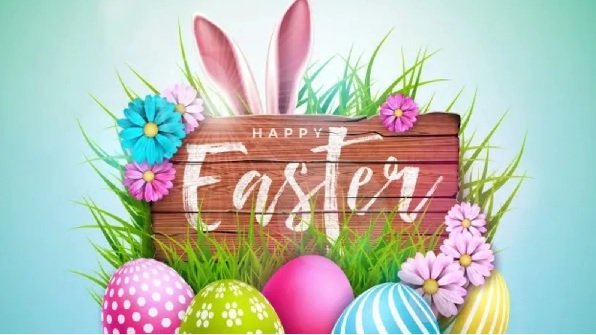Lifestyle News: Fashion, Health, Relationships & More | The Mirror - Graphic Online

What's the significance of the holidays before and after Easter?
Easter means the celebration of hope
Why do we celebrate Easter? Christians around the world celebrate the resurrection of Jesus from the dead on Easter Sunday and thus the foundation of the Christian faith. The resurrection gives them hope for eternal life. Thus, Easter is also called the festival of hope by believers. "Whoever knows Easter cannot despair," the theologian Dietrich Bonhoeffer once said in dark times.
What is the significance of the holidays before and after Easter?
The preparation time for Easter already begins on Ash Wednesday, the actual Easter period lasts from Easter Sunday to Pentecost. We have taken a closer look at the significance of the individual holidays around Easter.
Ash Wednesday
Ash Wednesday marks the end of the cheerful carnival season and the beginning of the serious and depriving Lent. Through renunciation and reflection, the faithful prepare for Easter for 40 days. Jesus serves as a model for them, as he himself persevered in the desert without food or drink and resisted the temptations of the devil (Mt 4:1-2). Ash Wednesday is a day of strict fasting and abstinence - meat is taboo on this day. Furthermore, only a single satiation is allowed, as well as a small snack in the morning and in the evening.
Palm Sunday
Palm Sunday is the prelude to Holy Week or Passion Week and recalls Jesus' entry into Jerusalem (Mt 21:1-11), where he wanted to celebrate the Passover with his disciples. The longed-for King of Peace was received jubilantly as the "Son of David". The people showed their reverence by spreading palm branches before him in the street. They hoped he would free them from Roman occupation. Jesus' popularity was a thorn in the side of the Romans. They feared he might become too powerful.
In memory of the events in Jerusalem, the faithful have palm or olive branches blessed on Palm Sunday. Afterwards, they go into the church in a solemn procession. After mass, following an old custom, the consecrated palm branches are taken home and placed behind a crucifix, for example, or attached to home altars or images of saints.
Maundy Thursday
Maundy Thursday marks the beginning of the three Holy Days in the narrower sense - the so-called Triduum Sacrum (Latin for "holy three days"). According to biblical tradition, Jesus celebrated the Passover with his disciples on the eve of his arrest.
He asked them to celebrate the Lord's Supper together in his memory. Jesus already knew that one of the twelve apostles would betray him to the Romans (Mt 26:21). As a sign of charity, he even washed his disciples' feet (Jn 13:5-15).
On Maundy Thursday, Catholics also celebrate the Mass of the Last Supper. During this service, the priest symbolically washes the feet of some of the faithful - just as Jesus did with his disciples.
By the way: the name Maundy Thursday is not derived from the colour green, but probably from the Old High German "Grunen", meaning to weep or cry.
Good Friday
The name Good Friday is derived from the Old High German word "kara", meaning lament or mourning. It is the first day of the holy three days that symbolise the central message of the Christian faith of the suffering, death and resurrection of Jesus Christ.
On Good Friday, Jesus was condemned to death and crucified by the Roman governor in Judea, Pontius Pilate. According to biblical tradition, other condemned people also died on the cross with Jesus. Since the 15th hour of the day is considered to be the hour of his death, Good Friday liturgies also take place at this time.
Throughout the ages, people have made offerings to God to honour him, to thank him or to make atonement for their sins. In the Old Testament, such sacrifices were required by God himself. Jesus sacrificed himself on the cross to the Father on Good Friday for all people.
Through his suffering and death he redeemed us from original sin, from our own sins and from eternal damnation. This one sacrifice is made present at every Holy Mass in the celebration of the Eucharist.
Reflection, silence and fasting mark the day, accordingly it is sometimes called "Silent Friday". On the day of Jesus' death, Catholics walk the station of his way to the cross in order to visualise his path to death.
For Protestant Christians, Good Friday has been one of the highest holidays since the 19th century, since Jesus' death, not his resurrection from the dead, is supposed to have redeemed people from original sin.
Holy Saturday
Holy Saturday is the last day of Holy Week and the second day of the holy three days. Holy Saturday is sometimes called Silent Saturday, because the church bells are silent and there is no service. It is the day of the Holy Sepulchre, when believers focus on the grief and pain of Jesus' crucifixion.
Easter Sunday
With the beginning of the celebration of the Easter Vigil, the 40-day period of Lent comes to an end in the morning on Easter Sunday. On Easter Sunday, Christians celebrate the resurrection of Jesus and the victory of life over death. Easter is the highest celebration of Christianity. Because the resurrection establishes the belief in life after death.
Easter Monday
Easter Monday commemorates the two disciples who set out on the road to Emmaus on the day after the Resurrection. On the way, they met the Risen Lord, who made himself known to them. Afterwards they spread the news of the resurrection with full joy (Lk 24:13-29). Thus, according to former Pope Benedict XVI, the history of Christianity as that of a faith had begun. From that moment on, the Church could be formed as the community of believers in Christ.
Pentecost
The Easter season of joy begins on the morning of Easter Sunday and does not end until 50 days later with Pentecost, the feast of the Holy Spirit. The first eight days after Easter form the so-called Easter Octave, an eight-day festival week.

